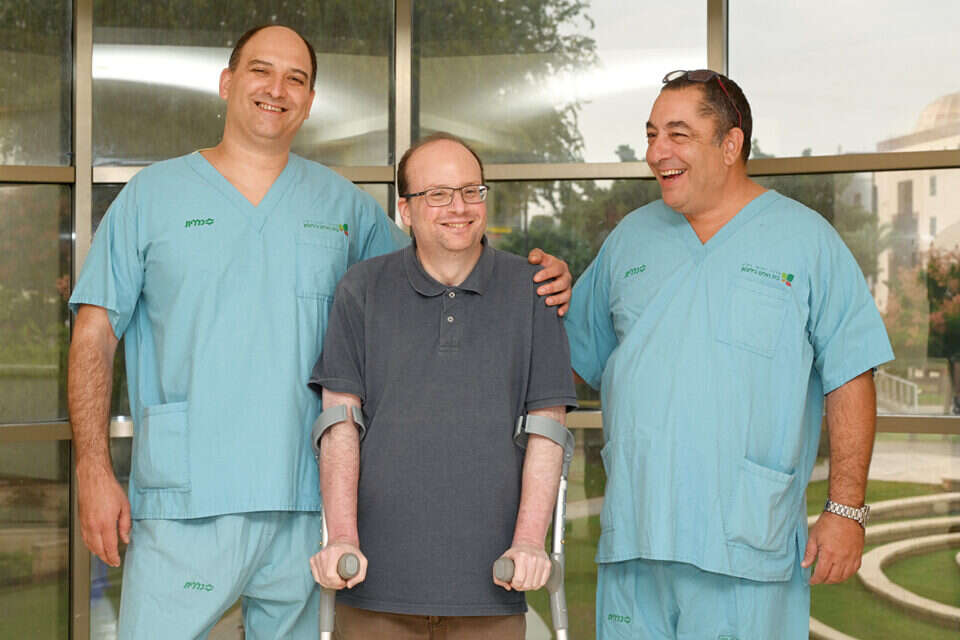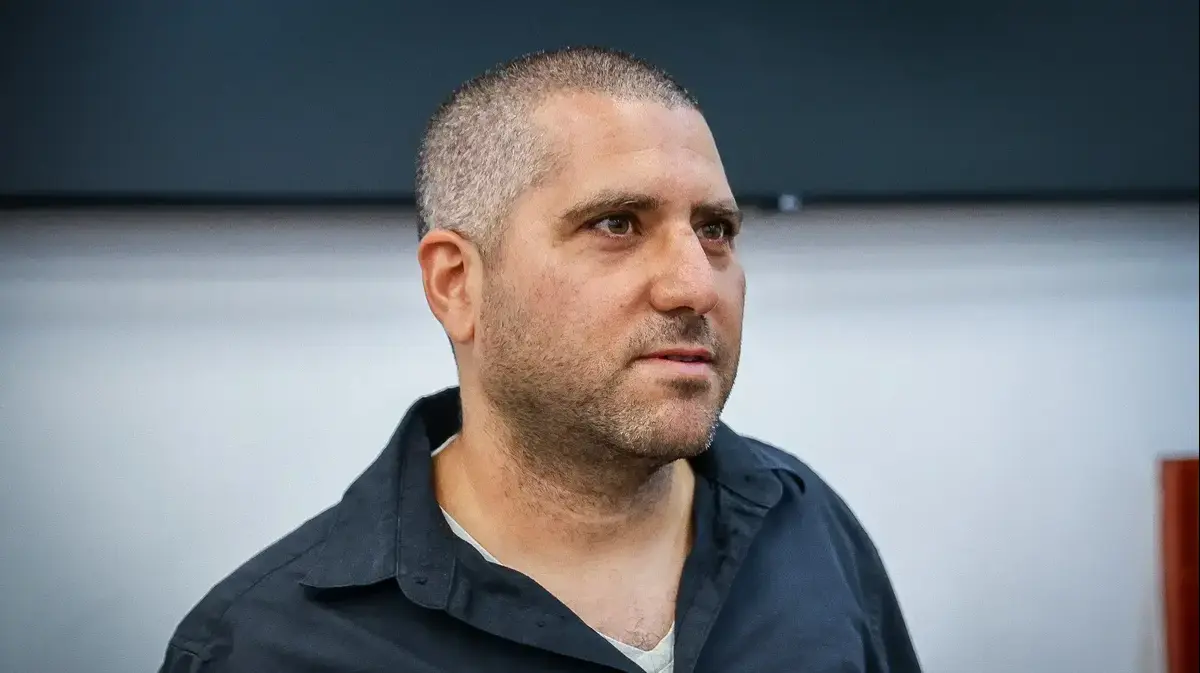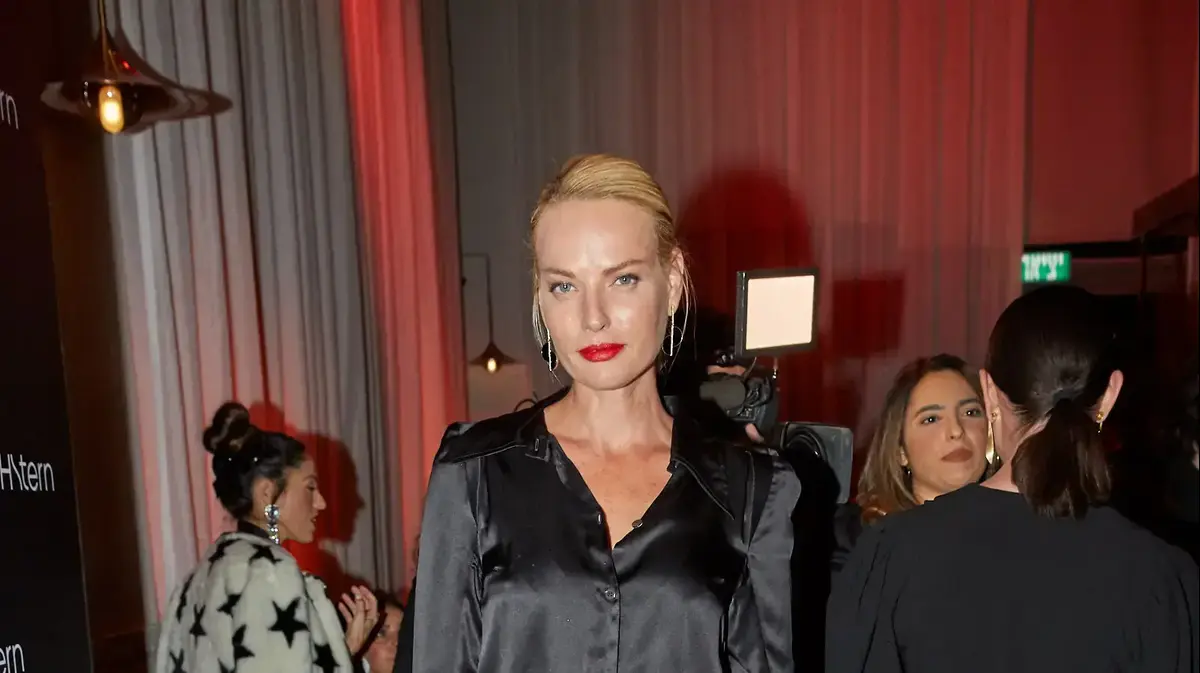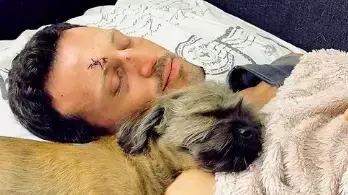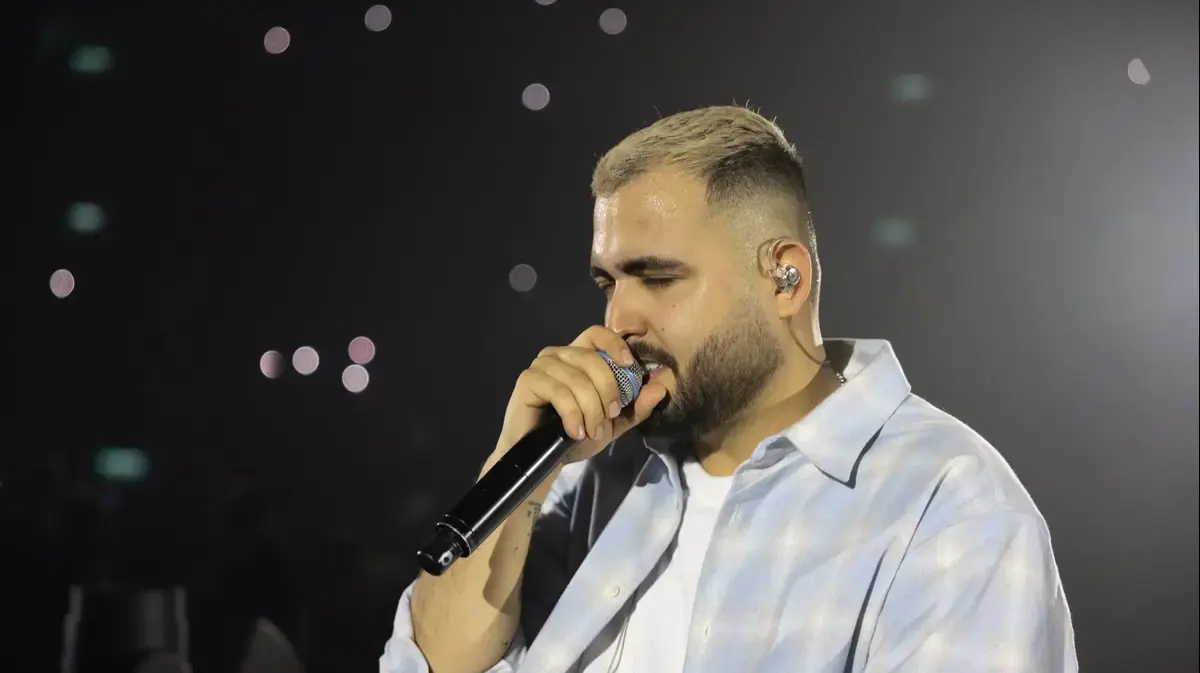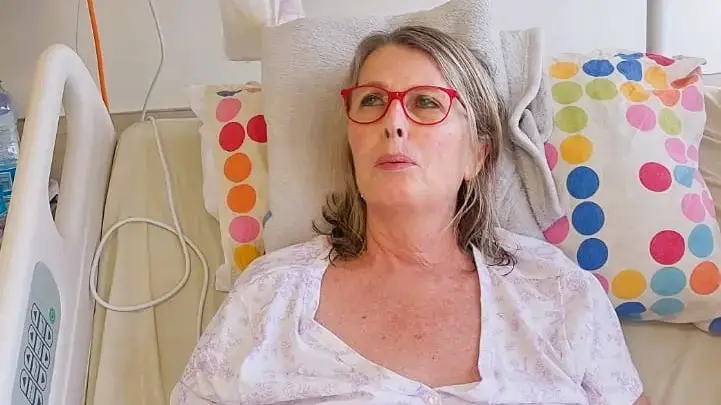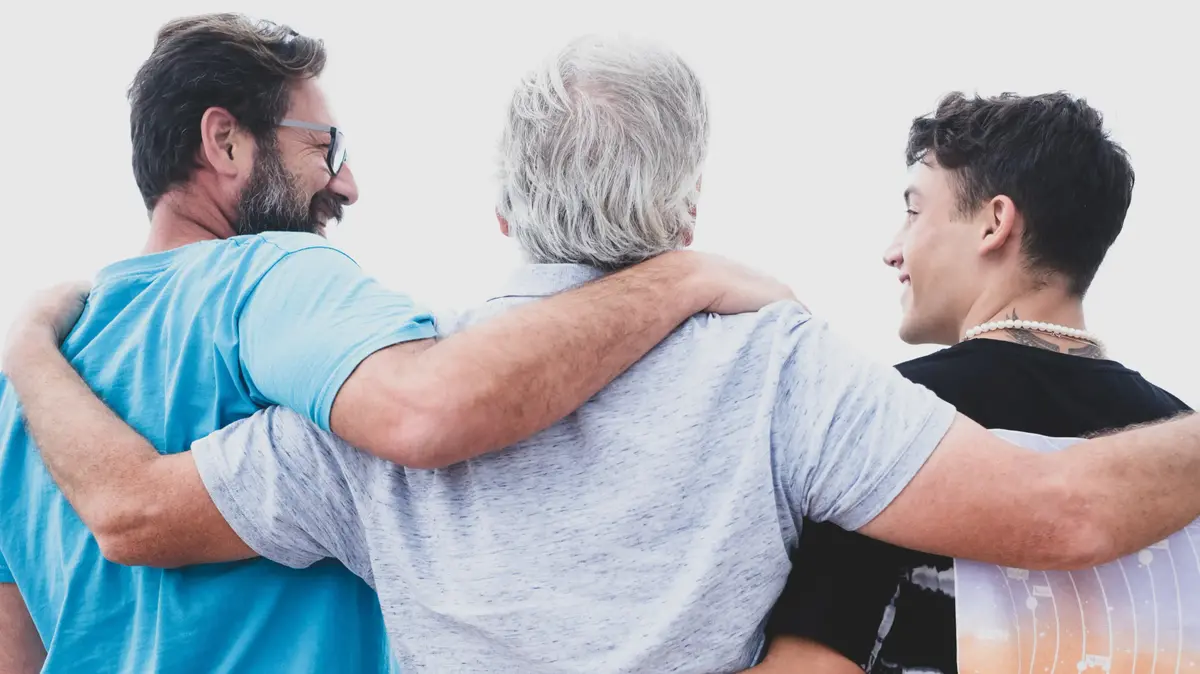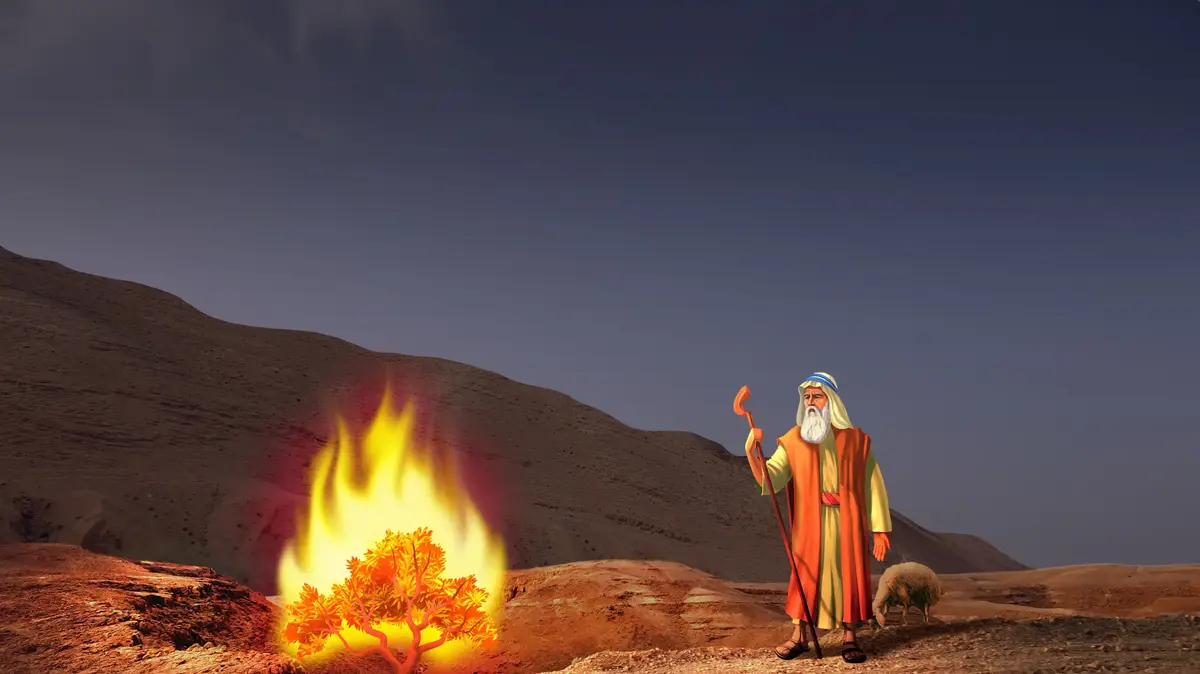There are exciting, formative moments that burn into the heart of the most experienced and experienced surgeon.
It happened to Dr. Yuri Feishovich, director of the breast surgery unit at Beilinson Hospital, after two complex surgeries in which he removed from Dr. Shai Cohen's body a huge 30 cm cancerous tumor, which sat in the left chest and also grabbed the diaphragm, abdominal cavity and three vertebrae In the spine.
"The surgeries we performed on Shay, which involved dozens of doctors and staff, are almost science fiction," says Dr. Feischowitz, who still finds it difficult to relax. this.
Half a year after the surgeries I met Shai, we saw his CT together - and the tumor disappeared completely.
We managed to save his life. "
Shai himself is unable to relax.
As one tossed between life and death, he knew that dangerous surgeries were his last chance to live.
"I went into surgery with fear of death, in crippling fear," he recalls.
"I knew I might not get out of there alive, or become paralyzed. That's the most terrifying feeling there is.
"What happened to me is a real miracle. It took almost a month until they managed to wake me up, but I survived it. I am alive and kicking, and full of motivation to get back to my normal life."
• • •
In his normal life, Shai Cohen (50) is a doctor of linguistics from Herzliya, who until a year and a half ago was completely healthy.
In his wildest dreams he could not imagine what was going on in his body without his knowledge.
He was born in Tel Aviv, and at the age of 7 moved with his parents Miriam (74) and Menachem (76) and his younger brother Nir (45) to live in Herzliya, where the family lives to this day.
In the army he served in the Education Corps, and later studied for a bachelor's degree in linguistics at Tel Aviv University.
After graduation he worked in preparation for matriculation at private institutes.
In 2001 he was accepted to study for a master's degree and doctorate in the Department of Linguistics at Amherst University in Massachusetts.
He received a full scholarship and completed both degrees in 2008.
After graduating, he taught linguistics and Hebrew at Binghamton University in New York State.
Two years later, he returned to Israel and worked as a linguistic consultant for companies.
In August 2019, Shai was hired as a lecturer in Linguistics and Hebrew at Emory University in Atlanta.
He traveled to the US, was very successful, and was supposed to extend his contract for another year. But the mysterious pain in his left waist did not give him rest.
"I felt the pain for nine months," he says, "they were tolerable, and I didn't attach much importance to them. I was completely engrossed in work and routine. At one point I went to my doctor in Atlanta, and she suggested I have a CT scan of my stomach. I did not think it was urgent. , And I told myself there was a lot of radiation in the CT, so I postponed the test.
"But the pain got worse. In May 2020, at the end of the school year, I did the test. The next day my doctor called, almost scared, and announced that they had found a large lump in her stomach. She said she had never seen such a large tumor.
"I was in the market. The CT decipher radiologist recommended that I also do a chest CT. I did the test after two days, and there they saw a huge tumor that starts from the chest, reaches the diaphragm and abdomen, to the spine.
"The sky fell on me. And I'm alone in the United States.
I immediately called my parents and my brother Nir and told them.
They were shocked.
Then I talked to friends, they also did not believe.
"It was clear to me that I was returning to Israel immediately. I informed the university that I was not continuing, I told them what had happened. Within two weeks I was already in Israel."
He landed in Israel on June 1, at the height of the Corona period, and went into solitary confinement for two weeks at his parents' house.
There he began to think about how he was coping with the new situation.
"When I came out of the isolation I did a CT scan. It turned out that the tumor did not metastasize, but is one large sequence. On biopsy, it turned out to be a tumor type of lumiosis, rare and very violent.
"I immediately started chemotherapy at Ichilov. For four months, once every two and a half weeks, I was hospitalized for four days of chemotherapy. The goal was to try to reduce the tumor so that it could be operated on and removed more easily. But doctors warned in advance that the chance was only 30 percent." .
The chemotherapy did not work.
The tumor did not shrink significantly, and it was clear that it had to be removed urgently.
But this type of surgery is considered rare in the world.
"It is rare to have surgery that involves both the chest and the spine," says Shai.
"Ichilov treated me wonderfully and was willing to operate on me, but I wanted a second opinion. In November 2020, I contacted Dr. Alona Zer, who was then an oncologist at Beilinson (now the director of medical oncology at Rambam Hospital; NAN). A chemistry was formed between us. "Good. She recommended I have the surgery at Beilinson and said she trusts the surgeons. I decided to go with her recommendation."
• • •
The rare procedure was performed in two surgeries and required preparation and planning of long weeks.
Dozens of experts were recruited for the operation.
"In the first operation, the purpose was to create a way that would leave the spine intact, and to find a way to excise the three vertebrae that the tumor had reached," explains Prof. Eyal Yitzhak, director of the spine surgery unit in the neurosurgical department.
"This is an almost impossible situation to perform. We knew we had to act perfectly and stabilize the spine, so that in the second operation it would be possible to remove the tumor in its entirety, without harming the patient."
"In order to prepare for the surgeries, we consulted with colleagues at cancer centers abroad," Dr. Feischowitz continues.
"I personally spoke with colleagues I value from Canada. We knew we had to be prepared for any situation - before, during and after the surgeries. We printed a 3D model of Shai's spine and chest, according to his real data, and planned a move after a move."
Yitzhak: "We knew that we must not break the tumor shell and disassemble it, but must remove it in its entirety - otherwise it may return. We told Shai that the chance of success of such an operation is only 40 percent, and that there is danger to his life during the operation. He may remain paralyzed. "
• • •
The medical drama kicked off on March 8th.
The team in the first operation was headed by Prof. Yitzhakiak, and next to him was Dr. Amir Hasharoni, also from the Spine Surgery Unit.
The first operation, in which Shai lay on his stomach, began after careful coordination with the anesthetists, Dr. Jonathan Ralph and Dr. Andrei Hinchuk.
They required careful anesthesia planning and continuous monitoring of vital signs.
"We cut the part of the vertebrae that was inside the tumor, we cut the ribs that are attached to the tumor and the vertebrae, and we stabilized the spine at the back by inserting screws and rods, which created stabilization along the spine after the vertebrae were removed," says Prof. Yitzhak.
"Shai bled a lot during the operation. He lost five liters of blood, which is more than the volume of blood in his body. In fact, we changed all his blood during the operation."
After 12 hours, Shai was transferred to the intensive care unit, anesthetized and respirated.
He lay like this for two days, then was transferred to the second operation, headed by Dr. Feischowitz, in which the tumor was removed. .
The doctors did not wake Shai from the anesthesia, so the second operation could be performed without the need for re-anesthesia.
This time, Shay lay on his side.
"We opened both the abdomen and the chest at the same time," Dr. Feischowitz continues. "The tumor was just huge.
He grabbed two-thirds of Shay's left lung, muscles, diaphragm, abdomen and chest, and entered the spine.
As a surgeon, I have never made such a huge tumor expense.
But I felt we were going to succeed.
It's a deep inner feeling of a surgeon.
All teams worked in brilliant collaboration.
"At first I separated the tumor from the aorta in the chest, then we cut the lung lobe, in a process where we invested a lot of advance planning. The tumor occupied the left thoracic cavity and 60 percent of the left lung, but if we took out the whole lung, his chances of survival were nil. We spent 60 percent.
"Due to the spread of the tumor to the abdominal cavity, including the main artery in the abdomen, we also involved Prof. Jacques Baniel, the director of the urology department at the hospital. He worked on detaching the tumor from the kidneys and main artery.
The second operation lasted 18 hours, at the end of which Shai was transferred to the Lung Intensive Care Unit.
Despite the success of the surgery, the medical staff did not move from it.
"Two days after the operation, blood accumulated around his heart," says Dr. Feischowitz. "I was able to drain his blood with a needle only, but three days later it happened again, and we had to perform another operation to drain the blood."
Due to the intensity of the anesthesia he received, Shai had difficulty waking up.
All the while, Shai's parents, brothers and friends sat by his bed, worried that he would not wake up.
Shai says that while he was anesthetized he experienced nightmares and severe hallucinations.
"Even though I was not awake, I really remember dreaming that I was dead, that the Iranians kidnapped me, that I was in London during the Corona, walking down the street and unable to breathe. I really remember it as a big nightmare."
"I meet up with friends in cafes and go to the movies. The optimism is back to me."
Shai Cohen, Photo: Efrat Eshel
After almost a month, he regained consciousness for the first time, and finally met his family.
"It was very exciting," he recalled.
"Mom, Dad and my brother were in the room, and we all burst into tears. There was great joy that the surgery was successful, and that I woke up. I came back to life. The devotion of my family and friends knew no bounds all along, they did not leave me for a moment. It really touched me and moved me greatly." .
He remained in the Beilinson Intensive Care Unit for another three weeks, during which he also underwent physical therapy.
I was treated with great dedication, and I felt that I was very important to the medical staff and that I was doing everything to get myself back.
They also tried to get me on my feet, but it was in the very early stages.
It was clear to me from the beginning that this was a long and not an easy process. "
In mid-April, Shai underwent respiratory rehabilitation at Sheba Hospital in Tel Hashomer.
"I was treated wonderfully, but I went through three very complex months, physically and emotionally. There were stages where I was in a very bad mood. I was afraid I would not be able to stand on my feet again, that I would have to sit in a wheelchair all my life.
"I was depressed and unloaded it in front of my brother, in front of my parents and in front of my friends. I had bursts of crying and quite a few moments where I thought I could no longer. In those moments, when I needed support, family and friends proved they were with me. "On the physical side and also on the emotional side. During the rehabilitation I was able to walk with the treadmill ten steps, and then twenty. It was important for my safety."
After four months in the hospitals, during which he underwent three surgeries and grueling rehabilitation, Shai was released to his parents' home in Herzliya.
He still needs their help, physically and emotionally.
Slowly he began to walk with the help of crutches and to come three times a week for day rehabilitation in Tel Hashomer.
To this day he is in rehabilitation, working hard in physiotherapy treatments, occupational therapy, communication clinician, hydrotherapy and dietitian.
"For me, the main thing is that I came back to live and be independent," he smiles.
"I feel very good, my appetite has returned and I have gained weight. I can shower alone, use the toilet, brush my teeth. I leave the house with the crutches, meet with friends in cafes and go to the movies. The optimism is back to me.
"At home I even walk a little without crutches, but it is still impossible to know if I will be able to walk on my feet without support. It is a problem of weakness and coordination between the muscles in the back, abdomen and thighs. I work a lot on walking and body erection. "I'm goal-oriented."
• • •
He does not have a relationship at the moment.
"I'm still totally invested in the hard rehabilitation work and back to life. When I did my PhD in the US, I had a girlfriend that I really liked.
We were together for two years, there was a strong love, but it did not ripen for the wedding, and we broke up.
I have a desire for love, and I hope that after I recover and rent an apartment, I will be able to find a partner as well. "
In the meantime he is preoccupied with research.
"When I have time during the day, especially when I'm not in rehabilitation at Tel Hashomer, I work on an article in the field of linguistics, which I very much hope to finish and publish. In my spare time I read a lot of books and watch TV series."
Is there a fear that the cancer will return?
"According to the medical literature, in a cancer of my kind there is a good chance it will come back. But right now I am focused on recovery. I went through a very difficult time, with surgeries from which I could not even come out alive, and here I am. I do not have enough words to thank the wonderful people from Beilinson, the surgeons To the oncologist, to the rehabilitators, to all the dozens of people I'm here for, it's not obvious.
"A miracle happened to me. I started my surgical journey nine months ago, and here I am at home. I will light Hanukkah candles with my parents and brother, and maybe even with friends. For me it is the happiest holiday I could have asked for."
erannavon9@gmail.com
Were we wrong?
Fixed!
If you find an error in the article, we will be happy for you to share it with us and we will correct it

